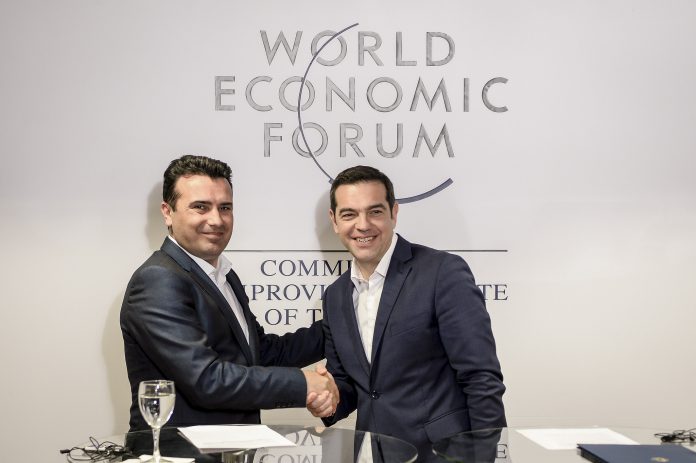Ab ovo, ad infinitum
After nearly three decades of “the name dispute,” a resolution is on sight, against the expectations of the wider Macedonian public. However, the press conference by Prime Minister Zoran Zaev and the joint public statement on the final agreement makes the conclusion of this process inescapable. This was a political thunderstorm, an avalanche, triggering tempestuous reactions at home. Most Macedonian citizens see this dispute as superficial and hardly recognize the problem as such; public opinion would not support any name change, especially one that has an erga omnes application.
The political discourse is polarized.
On the one hand, all international actors and neighboring countries support and welcome the resolution, although Bulgaria is not entirely satisfied with the substance of the solution.
The commonly agreed term “North Macedonia” was not a surprise. It is a solution under consideration for years. Nonetheless, the conservative opposition VMRO DPMNE capitalized on existing grievances to proclaim capitulation and defeat the day after the announcement. The opposition called for a massive rally on Sunday. Some of the MPs were louder than others through their social media networks, and many academics linked to the previous ruling structure came up in public with a coordinated punch line, vehemently renouncing the “national defeat,” and arguing that such a capitulation is in fact illegal.
This stance gained some resonance and wider support internationally.
Zaev’s announcement was followed by huge protests in front of the parliament, organized mostly by the opposition. The participation of youth and the orthodox church was notable. There was hate speech, which was condemned by wider parts of the progressive political establishment, but also the sizable Albanian minority that feels affected but not involved in this conflict. There were arrests and inevitable controversy. On Thursday, there was another protest and this is likely to last for the foreseeable future.
Protests are expected to continue on a daily basis in the forthcoming period across the country, including Bitola and Prilep.
The bigger problem is that Prime Minister Zaev and the Minister of foreign affairs Nikola Dimitrov have met staunch opposition within their own ranks, from party members and MPs, journalist, and even a prominent activist. The details of the agreement have alienated big parts of centrist forces, especially the erga omnes term, which means that that name agreed will not be used vis-à-vis Greece alone, but for all purposes, while citizens of the country will be referred to not as “Macedonians” but as “citizens of Northern Macedonia.”
Zaev’s counters that the language and the identity is recognized as “Macedonian.” However, Zaev’s press conference was held on Tuesday afternoon and the agreement was published on the government’s website on Thursday evening. That time gap allowed space for speculation and anger to surge, reinforced by rumors coming from Greek media sources. Besides, the agreement affects the countries that have recognized Macedonia by its constitutional name, which is seen as a surrender of previous diplomatic achievements, and perceived as the broken promise that Zaev gave a year ago.
In a meeting held on Wednesday at the Presidential residence, President Gjorge Ivanov left the room and claimed that Zaev’s agreement was nothing but a personal deal, adding that his would not ratify this illegal construct. Artists and architects also rejected the parts of the agreement that calls for renaming monuments linked to the “Skopje 2014” project, although many are illegal constructions.
The general feeling is that the Macedonian government gave too much in this negotiation but Zaev appears convinced that it is the right deal. At the moment, it is unclear whether he is too naïve or too realistic. If the country does not receive an invitation to join NATO this July, he will face an explosive political pushback. His government is founded on a small minority and a turbulent shaky coalition, and this fine balance has been threatened. The referendum may yet be won on the back of Albanian coalition partners.
Naturally, there are also people who support and stand by the agreement in its entirety, mostly on the basis that it is time to move forwards. However, those voices get lost in the noise.
The Governments communications team could have done better by making the whole agreement transparent, as well as the negotiation process itself. Often, there was too much space for speculation. In reality, it remains unclear how much this government actually conceded and how much of this agreement was founded on the concessions of previous administrations. But, this is a matter of identity that runs deeply into the psyche of the people and the taste of bitterness prevails across the country. It will get much worse before it gets better.
No matter how this feels, the truth is that Zaev is making history. To borrow the words of a Facebook post by Ognen Janeski – a prominent journalist and activist – “congratulations to prime minister Zaev and his team for jumping into a fire like no one has done before.” If Zaev survives this whole process, physically and politically, he deserves a nomination for the Nobel Peace Prize.
Vesna Poposka is an independent analyst, PhD candidate of international relations and security at the Macedonian Military Academy.

